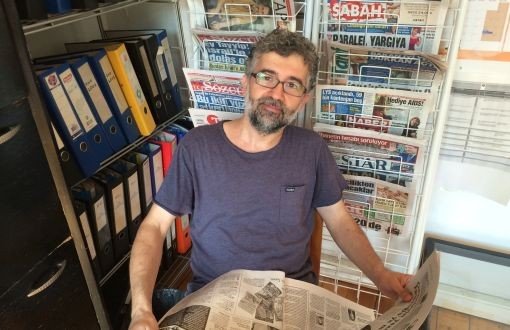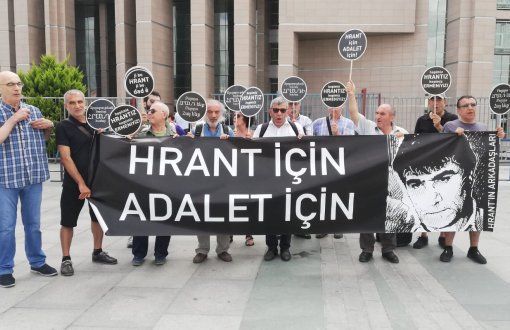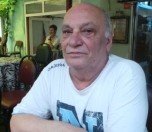STRUGGLE FOR PRESS FREEDOM DAY
Önderoğlu: The media received its report card in Gezi

Erol Önderoğlu has witnessed Turkey’s regard for freedom of expression in all press and journalist murder cases and in courtrooms judging books, poems and columns since 1996.
Reporters Without Borders (RSF) organization Turkey representative and 18-year employee, bianet’s BİA Media Survey Reports rapporteur Önderoğlu follows the violations of freedom of press and expression in Turkey and prepares reports that share them with the world.
bianet talked with one of this year’s Turkey Journalists’ Association’s (TGC) TGC Press Freedom Awards recipient Önderoğlu about his 18 years on watch.
The struggle that began with Metin Göktepe
You started both journalism and your work in the RSF after Metin Göktepe’s murder in 1996. How do you remember that time?
When I think of the Göktepe murder, I remember the effective struggle journalists and rights activist in Turkey put up to illuminate that murder. We braid our sensitivity today after that sensitivity of that time.
The RSF office was operating for active journalist struggle in that time. Therefore I actively took part with Nadire Mater in watching the trials, announcing the hearings, providing vehicles, organizing, etc.
Also, the Göktepe murder entered everybody’s sphere of interest both in Turkey and abroad through the TGC’s decisive stance and RSF’s pursuit of the case.
The journalists showed serious strength of will in keeping up with the hearings. Back then the way journalists bonded with the profession and with one another were different; they could be more decisive. It wasn’t easy for a reporter, an editor, and a columnist to come to watch the hearing in Afyon province. So their scope of movement was much better compared to now.
But we cannot propagate such struggles.
Government mechanisms in Turkey do not learn from their mistakes. When we look at what was done in terms of freedom of the press and of expression in the past 20 years that I remember, today’s violations should have greatly disappeared. But it’s not enough for rights to be put down on paper or regulated.
Just as military custody and the judiciary exerted pressure on journalists in the 1990’s, twenty years later the same legal mechanisms apply pressure on the media today.
The struggle for Işık Yurtçu's freedom
What was the event that struck you the most in these past 20 years?
Aside from the pursuit of Metin Göktepe’s murder, in terms of arrested journalists, it’s Işık Yurtçu’nun release from prison.
Yurtçu was editor in chief at Özgür Gündem newspaper. When I started journalism, he had been in prison for a few years for his news items and colums. The Yurtçu event was the first example that showed how Nadire Mater toiled for Kurdish media. Because we were trying to let people know that there were journalists not just in mainstream media, but also in Kurdish media.
The international campaigns for Işık Yurtçu led the mainstream media in Turkey to empathize. RSF gave Yurtçu a press freedom award. Yurtçu’s message was read in France while he was still incarcerated. Thanks to that, a committee made up of international journalism organizations spoke with the Prime Minister and drew the Parliament’s attention to this issue. And Yurtçu set free with an amnesty. Besides that, the editors in chief in prison were let go, and ongoing lawsuits were suspended.
At least in the 1990’s they listened to us when we got our voices heard in the international arena. The Parliament would agree to our suggestions and we could produce solutions. Today I don’t think any parliamentary representatives heed any non-governmental organization while doing reforms, no matter which social segment the reforms target.
The Chief of Defense an enemy of press freedom
You have been announcing the violations to freedom of the press and of expression in Turkey since the 1990’s. Have you ever encountered any pressure on that matter?
In the 1990’s, the military kept the media under its control and journalists were developing a practice tightly wound with the Ankara bureaucracy. The view of international organizations was antagonistic as always.
In 2003, RSF had placed Turkey on the Enemies of World Press Freedom Map to condemn the military’s influence on Turkey’s Radio Television Supreme Council (RTÜK) and State Security Courts, and put Full General Hüseyin Kıvrıkoğlu’s photograph on the map. There were other world leaders on the map as well.
In that period I got to see what military oppression was like. I was getting a lot of phone calls. Publications such as the Workers’ Party and Aydınlık newspaper, as well as the radical right and pro-government newspaper and broadcast organizations constantly featured RSF on their headlines.
“How could you print our Chief of Defense’s, our soldier’s picture saying enemy to press freedom?” they were saying. Kıvrıkoğlu sued RSF for using his photograph without permission. RSF filed a counter-case. Kıvrıkoğlu got convicted in that case, but no newspaper in Turkey was able to report on that.
AKP's changing attitude from 2002 to 2006
We entered the 12-year AKP period after the 1990’s. What changed in this period and what remained the same?
AKP took on freedom of expression regulations on “defective Turkish Penal Code (TCK) articles” that we had never been able to change. AKP was applauded when it came to power touching on these issues. Adjustment laws relating to the judiciary came out between 2002 and 2005. So the AKP was attempting certain things on paper, and we thought there wouldn’t be any problems in practice.
However, starting 2004 and with the change in TCK in 2005, reactions started to intensify. This period for me was the most prominent instance that showed that this government had no regard for Turkey’s civil society movement.
People protested in front of courthouses, walked from the İstanbul Governorate to Sultanahmet district. TCK was reported to have more than 25 articles restricting press and increasing punishments. But the government wouldn’t have any of it.
With the conviction that the Kurdish Issue would not be resolved in a short amount of time, the Anti-Terror Law was changed and aggravated in 2006. As journalists arrested until a short while ago, we all suffered from how exploitable this new regulation was.
"They obliterated investigative journalism"
What changed in terms of journalism and the media?
Extremely experienced crime reporters were fired, for one. Because you don’t know when these crime reporters will pull up a case. They did away with elements of risk. Investigative journalism was eradicated.
When you look at mainstream media, at economic news, you might fail to distinguish between commercials and news. On the other hand, when you look at their foreign news you’ll see a police raid on whatever corporation in Germany or the detention of executives or products in a pharmaceutical company in France.
There is a caricature of a situation in Turkey. It’s like there’s no mobbing, deunionization, exploitation or black economy in this country at all. Corporations’ activities render a lot of developments invisible. Corporate campaigns, corporate merges, sponsorships get published, but the media doesn’t monitor them at all. So today’s taboo is finance.
People really doing investigative journalism at a time when investments are going well can be deemed traitors.
The media took a lot of hits in the last year. The Gezi Resistance, toppled live broadcast vehicles, wiretapping recordings... What sort of change did these bring about in the reader/viewer?
Gezi was an objection to political exclusion in general as well as those who couldn’t find what they wanted from conventional political parties hitting the streets. This group that couldn’t see itself on mainstream media recalled in turn, classical broadcasting and the uselessness of this medium.
Meanwhile the mainstream media made its passivity painfully obvious in the first few days. My sister found out about Gezi events in France. But our national media could not air what was going on on Taksim Square. This being the case, people reacted.
People graded the media on Taksim Square. They asked, this media organ is here, why isn’t that one? In truth, the media got dealt their report cards in Gezi.
The Prime Minister’s lawsuits
If we are to speak a little about the BİA Media Survey Reports you prepare, your report for the first quarter of 2014 bears the title, ”The Prime Minister, Starring in Three Months’ Freedom of Expression Violations!” What does this mean?
There is not just a person in the Erdoğan profile. He is a person and he also has a public persona that has transformed the regime sculpted by the coalition governments. It’s not easy for the prime minister to become a parameter on its own in violations as in the reports.
We prepared the same report in the times of previous governments, but we never witnessed the prime minister simultaneously taking issue with the reporter, and the cartoonist, and the columnist, and the media patron. It wasn’t this way even in the time of military custody.
There is no end to the criminal suits the prime minister launched. Lawyers striving to sue local newspapers in myriads of cities in Anatolia, lawyers already in the bureaucracy and at his service in Ankara... these escape understanding.
"Newspaper administration cannot forget their prior stance"
The media started to discuss freedom of expression quite differently after the investigations of December 17 and December 25. Media organs such as Zaman newspaper, Samanyolu television channel, and Bugün newspaper that used to have a pro-government attitude now bring press freedom violations to the fore and station themselves on oppositional ground. How do you interpret this change?
There are flighty attitudes in Turkey on the press freedom issue, as on many other things. I do not think that freedom of the press and of expression is defended independently of political processes, interests and periods.
CHP, BDP and other political parties of the left have claimed the arrested journalist issue together, but the history of the struggle for press freedom does not go far back in our community. We have only been able to develop exemplary attitudes for arrested journalists.
But let’s not forget that when Ahmet Şık and Nedim Şener were arrested March 6, 2012, some of the publications that have turned around to claim them, such as Zaman newspaper, had branded these two journalists and the supporters of their struggle at that period. Aydınlık newspaper and that group that targeted RSF in 2003 joined us in the struggle with the arrest of journalists from its own network today.
However, I do not see these mentalities that change every five or ten years as a social boon. Citizens might have the right not to remember what happened two years ago, but newspaper administration do not have the luxury to forget their prior stance and present a fresh approach lacking self-criticism. And they do not have the right to do so, either. (EA/PU)
* Clic here to read the article in Turkish.
Hrant’s Friends on Watch at 75th Hearing

2 People Released from Prison in Hrant Dink Case

Hrant’s Friends are at Justice Watch at 72nd Hearing

Afrin Resident Blames ‘FSA’, Habertürk TV Translates as ‘YPG’
.jpg)
7th Hearing in Cumhuriyet Trial
.jpg)





